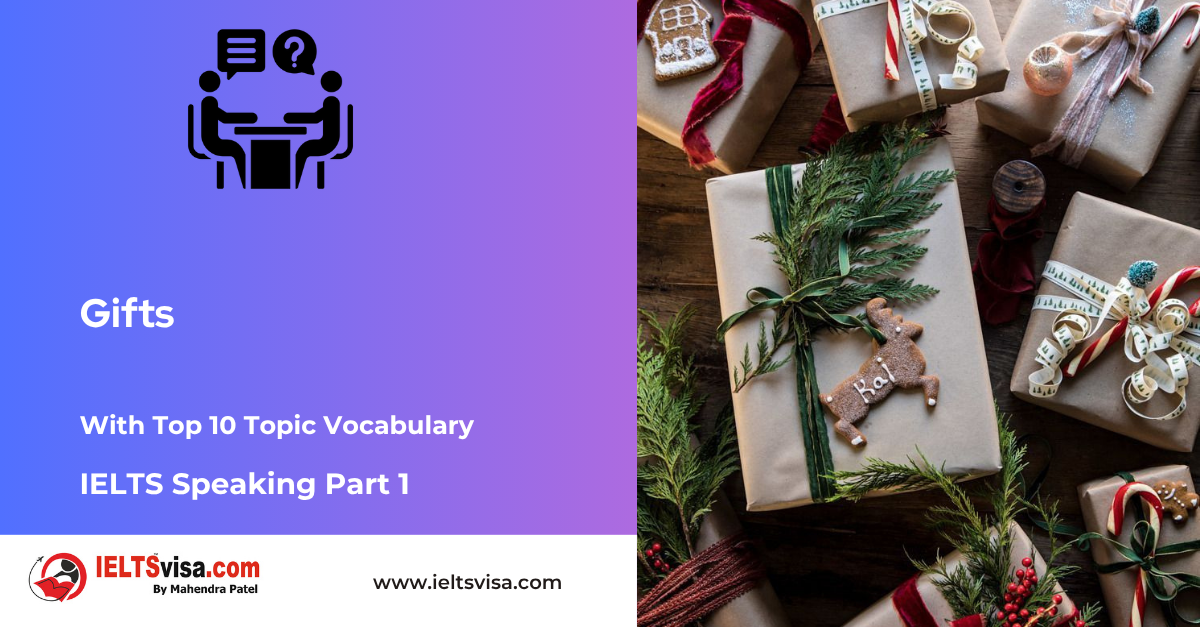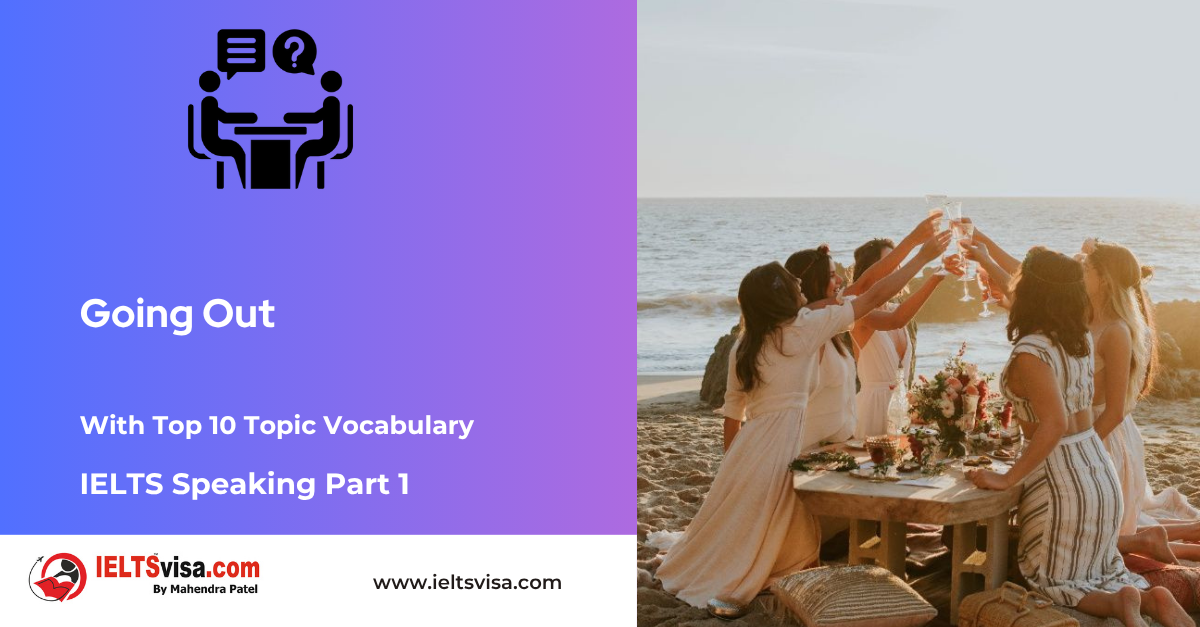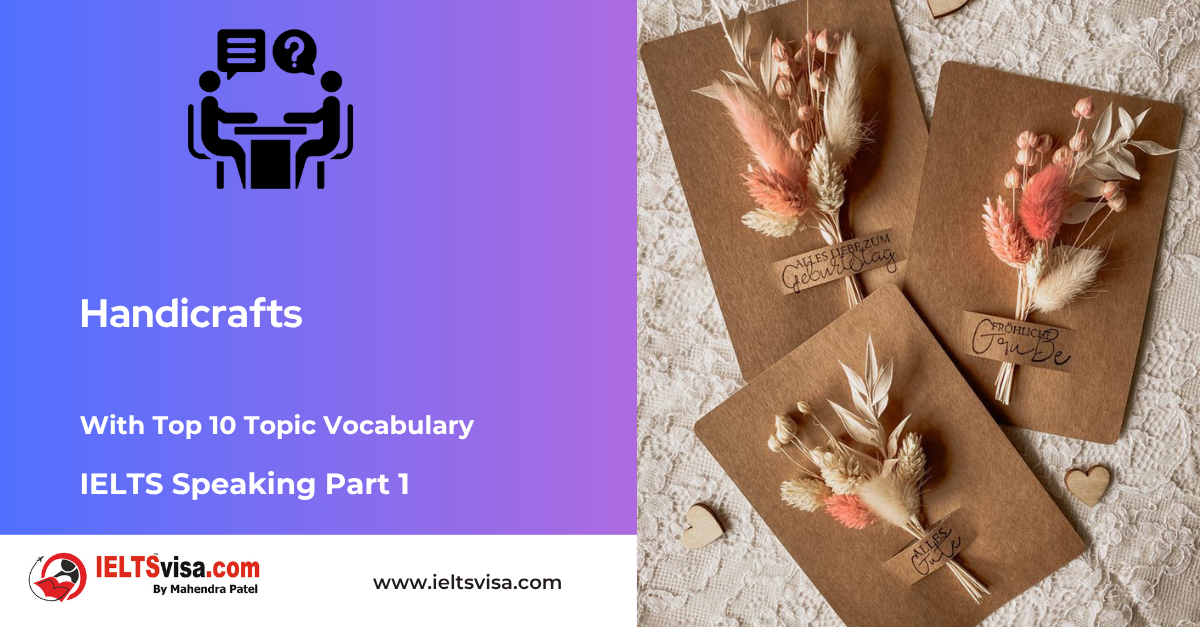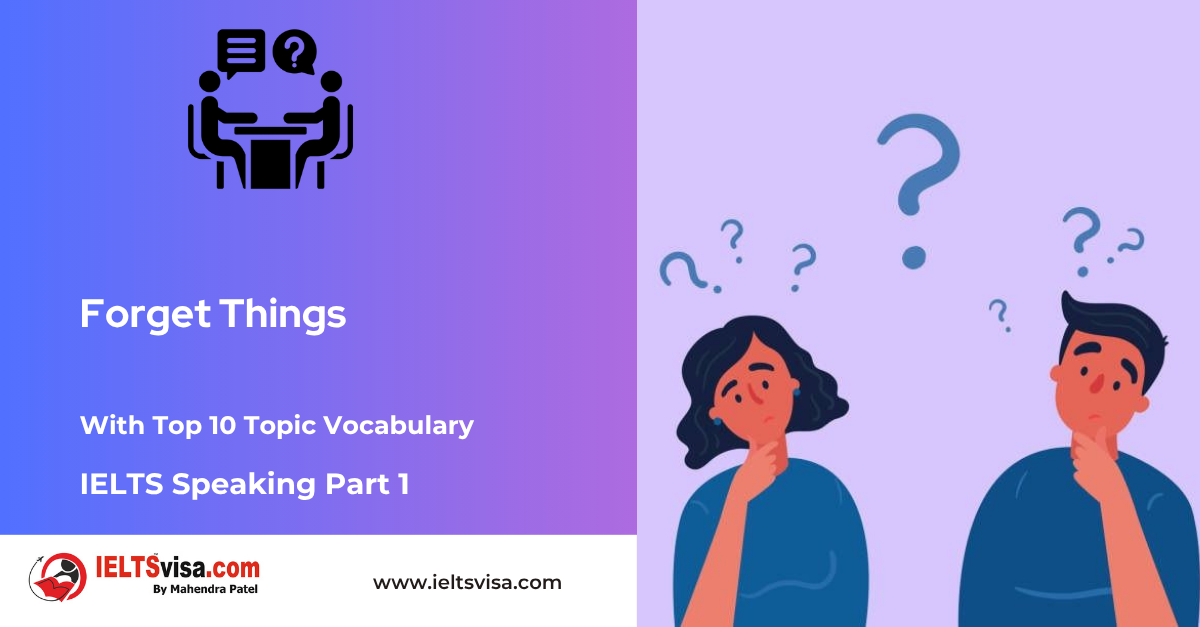IELTS Speaking Part 1 – Gifts
IELTS Speaking Practice
IELTS Speaking Part 1 – Gifts
Examiner: Do you like giving gifts?
Candidate: I enjoy giving gifts because seeing others smile and feel appreciated makes me happy.
Examiner: What kind of gifts do you prefer to give?
Candidate: I prefer to give personalized gifts that show I have put thought into what the recipient likes or needs.
Examiner: Have you ever received a gift you didn’t like?
Candidate: I have received gifts that were not to my taste, but I always appreciate the gesture and the thought behind it.
Examiner: What was the best gift you have ever received?
Candidate: The best gift I ever received was a handmade photo album from a close friend, filled with pictures and memories of our time together.
Examiner: Do you think giving or receiving gifts is more important?
Candidate: I think both giving and receiving gifts are essential. Giving shows appreciation and care for someone, while receiving makes you feel valued and loved.
Examiner: Why do people give gifts to others?
Candidate: People give gifts to express love, appreciation, and gratitude and to celebrate special occasions such as birthdays, anniversaries, or holidays.
Examiner: Is it difficult for you to choose gifts for others?
Candidate: Sometimes, it can be challenging to choose the right gift, especially if I don’t know the person very well or if they seem to have everything they need.
Examiner: Do you prefer to give or receive gifts?
Candidate: I prefer to give gifts because I enjoy selecting something special for someone and seeing their reaction when they receive it.
Examiner: What do you usually give as gifts?
Candidate: I usually give items that the person can use or enjoy, such as books, clothing, gadgets, or homemade treats.
Examiner: Do you think expensive gifts are always better?
Candidate: No, I don’t think expensive gifts are always better. Sometimes, a thoughtful and meaningful gift can have a much more significant impact than something that costs much money.
Examiner: How do you feel when you receive a gift?
Candidate: I feel happy and grateful when I receive a gift, especially if it shows that the giver knows and understands me well.
Examiner: When do you usually give gifts?
Candidate: I usually give gifts on special occasions such as birthdays, anniversaries, and holidays, and sometimes to show appreciation or affection spontaneously.
Examiner: Have you ever made a gift for someone?
Candidate: I have made gifts for friends and family, such as homemade cookies, knitted scarves, or personalized photo albums.
Examiner: Do you think re-gifting is acceptable?
Candidate: Re-gifting can be acceptable if the item is new and unused and would be appreciated more by the latest recipient. However, it’s essential to be thoughtful and considerate about it.
Examiner: What is the most common gift in your country?
Candidate: The most common gifts in my country are sweets, flowers, clothing, and gadgets, depending on the occasion.
Examiner: Do you keep the gifts you receive, or do you sometimes pass them on to others?
Candidate: I usually keep the gifts I receive, but if I receive something I don’t need or can’t use, I might pass it on to someone who would appreciate it more.
Examiner: What do children usually receive as gifts in your country?
Candidate: Children in my country usually receive toys, games, books, and sometimes clothing as gifts, especially on their birthdays and during festivals.
Examiner: Have you ever received a handmade gift?
Candidate: Yes, I have received handmade gifts, such as a knitted sweater from my grandmother and a scrapbook from a friend, and I cherish these personal and thoughtful gifts.
Examiner: Do you think it’s essential to wrap gifts?
Candidate: I think wrapping gifts adds to the excitement and anticipation of receiving a gift. It also shows that you’ve put extra effort into making the presentation memorable.
Top 10 Topic Vocabulary for “Gifts”
|
Vocabulary |
Type |
Meaning |
Synonyms |
Antonyms |
Word Family |
Example Sentences |
|
Appreciation |
Noun |
The act of recognizing and valuing something |
gratitude, thanks, esteem |
appreciate |
I appreciate the thoughtful gift. I really appreciate the thoughtful gift you gave me. |
|
|
Gesture |
Noun |
An action intended to communicate a feeling or intention |
act, motion, movement |
gestural |
Giving a gift is a thoughtful gesture. Giving a gift is a kind and thoughtful gesture. |
|
|
Cherished |
Adjective |
Treasured or loved |
prized, valued, adored |
cherish |
I cherish the handmade gift I received. I cherish my handmade gift because it is so memorable and meaningful. |
|
|
Thoughtful |
Adjective |
Showing careful thought and consideration |
considerate, attentive, reflective |
thoughtfully |
I try to choose thoughtful gifts. I try to select thoughtful gifts showing that I care about the person. |
|
|
Sentimental |
Adjective |
Easily moved by tender feelings, given to sentiment |
emotional, nostalgic, romantic |
sentimentality |
Some gifts hold sentimental value. Some gifts have special meaning and can evoke sentimental feelings. |
|
|
Generosity |
Noun |
The quality of being a generous willingness to give |
kindness, charity, open-handedness |
generous |
Giving gifts is an act of generosity. Giving gifts is a generous act that shows you care about others. |
|
|
Excitement |
Noun |
A feeling of great enthusiasm and eagerness |
exhilaration, delight, thrill |
excite |
Receiving a gift can be exciting. Receiving a gift can be an exhilarating and enjoyable experience. |
|
|
Anticipation |
Noun |
A feeling of excitement or expectation about something that is going to happen |
expectation, hope, looking forward to |
anticipate |
Wrapping gifts adds to the anticipation. Wrapping gifts can create a sense of anticipation and excitement for the recipient. |
|
|
Symbolism |
Noun |
The practice of representing ideas or qualities with images or symbols |
representation, imagery, symbolism |
symbolic |
Gifts can have symbolic meaning. Some gifts can have special symbolic meaning, such as a rose symbolizing love. |
|
|
Nostalgia |
Noun |
A sentimental longing for the past |
yearning, hankering, wistfulness |
nostalgic |
Receiving a gift can evoke nostalgia. Giving a gift can sometimes remind us of happy memories and evoke nostalgia. |

Our Books
Master IELTS Speaking Part 1
IELTS Writing Task 1 Book
IELTS Writing Task 2 Book
Practice IELTS Other Modules
IELTS Listening
The IELTS Listening test assesses how well you can understand spoken English in various contexts. It lasts about 30 minutes and is divided into four sections with a total of 40 questions. The listening tasks become increasingly difficult as the test progresses.
IELTS Academic Reading
The IELTS Academic Reading section assesses your ability to understand and interpret a variety of texts in academic settings. It is designed to evaluate a range of reading skills, including skimming for gist, reading for main ideas, reading for detail, understanding inferences, and recognizing a writer's opinions and arguments.
IELTS Speaking
The IELTS Speaking test assesses your ability to communicate in English on everyday topics. It lasts 11-14 minutes and consists of three parts: introduction, cue card, and a discussion based on the cue card topic.
IELTS General Reading
IELTS General Reading tests your ability to understand and interpret various types of texts. Here are some key areas and types of content you can expect to encounter in the reading section, along with tips for effective preparation.
IELTS Academic Writing Task 1
In IELTS Academic Writing Task 1, you are presented with a visual representation of information, such as graphs, charts, tables, or diagrams, and you are required to summarize, compare, or explain the data in your own words.
IELTS General Writing Task 1
In IELTS General Writing Task 1, you are required to write a letter based on a given situation. The letter can be formal, semi-formal, or informal, depending on the prompt. Here’s a breakdown of the key components to include in your letter
IELTS Academic Writing Task 2
In IELTS Academic Writing Task 2, you are required to write an essay in response to a question or topic. Here’s a guide to help you understand the essential elements of this task
IELTS Exam Tips
To succeed in the IELTS exam, practice regularly, familiarize yourself with the test format, improve your vocabulary, develop time management skills, and take mock tests to build confidence.
Grammer for IELTS
Grammar is the foundation of effective communication in English. Understanding tense usage, subject-verb agreement, and sentence structure enhances clarity and coherence in writing and speaking.
Vocabulary for IELTS
Vocabulary plays a crucial role in the IELTS (International English Language Testing System) exam, especially in the Speaking and Writing sections. Here’s an overview of why vocabulary is important and how it impacts your performance
RECENT IELTS SAMPLES QUESTIONS AND ANSWERS
IELTS Speaking Part 1 – Going Out
IELTS Speaking Part 1 - Going Out Examiner: Do you enjoy going out?Candidate: I definitely enjoy going out!...
IELTS Speaking Part 1 – Handicrafts
IELTS Speaking Part 1 - Handicrafts Examiner: Do you appreciate handicrafts?Candidate: Absolutely! I find...
IELTS Speaking Part 1 – Forget Things
IELTS Speaking Part 1 - Forget Things Examiner: Do you often forget things? Candidate: Sometimes, I forget...
IELTS Speaking Part 1 – Favourite Subject – History
IELTS Speaking Part 1 - Favourite Subject - History Examiner: What is your favourite subject?Candidate: My...
IELTS Speaking Part 1 – Friends
IELTS Speaking Part 1 - Friends Examiner: Do you have many friends?Candidate: I have a good number of friends....
IELTS Speaking Part 1 – Favourite Subject – Math
IELTS Speaking Part 1 - Favourite Subject – Math Examiner: What is your favourite subject? Candidate: My...













